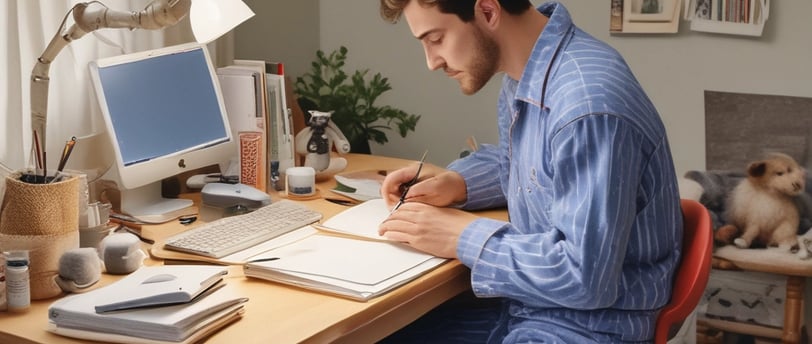The Impact of Social Isolation on Sleep Patterns Among Remote Workers
Discover how social isolation impacts sleep patterns among remote workers and why loneliness is more than just a mood dampener-it’s a sleep saboteur. This witty yet insightful blog explores the science behind disrupted sleep due to reduced social contact, increased screen time, and blurred work-life boundaries. Learn practical strategies like virtual socialising, routine setting, and light therapy to improve your sleep quality while working from home. Perfect for anyone juggling remote work and wellbeing.
Anna and Ai
5/23/20253 min read


Working from home is a dream come true for most of us until your social life whittles down to just you, your trusty screens, coupled with fictitious characters from your favourite Netflix series (YouTube for me). This week, we look at how social isolation messes with your sleep patterns, especially for us who work remotely with little face-to-face interaction with colleagues. You may start to miss being up to date with the latest office gossip or dipping your fingers into the communal biscuit tin.
The Lonely Road to Poor Sleep
We’ve all experienced the joys of remote work since COVID. No long commutes to work, exchanging your heels for fluffy slippers and hanging up your suit for Pikachu Pyjamas for online meetings. However, the darker side to remote work is social isolation. When your daily human interaction is reduced to a few pixelated faces on a screen, your brain can start to malfunction. There is evidence showing that loneliness and reduced social contact can disrupt sleep quality. This could cause insomnia, fragmented sleep, and even delayed bedtimes. (7).
It boils down to social isolation as a possible stressor, triggering feelings of vulnerability and hypervigilance. It’s your brain’s way of saying, “Better stay alert, just in case.” This heightened state of alertness is the exact opposite of what you need to fall asleep. Imagine trying to nap while someone’s shouting “Fire!” in the background. This is not ideal.
The Social Jetlag Paradox
On the flip side, some have reported sleeping longer hours thanks to flexible schedules. But, it can lead to social jetlag. With no usual office hours to keep you in check, your body clock can shift to later bedtimes and wake-up times. So, while you might be clocking more hours in bed, the quality of that sleep could be compromised, leaving you groggier than a Monday morning commuter.
Screen Time and Sleep: The Blue Light Culprit
Remote working means more screen time-laptops, phones, tablets, and the dreaded video calls. The blue light emitted by these devices suppresses melatonin, the hormone that signals your body it’s time to sleep. Remote workers reportedly spend around 13 hours a day staring at screens, which is two hours more than their office-based counterparts (4). This relentless exposure delays sleep onset and reduces sleep quality, making it harder to switch off at night.
Strategies to Combat Social Isolation and Sleep Woes
Fear not, all is not lost! Here are some practical tips to keep loneliness at bay and your sleep on point:
Virtual Socialising: Schedule regular video catch-ups with friends or colleagues. It’s not quite the same as a pub quiz night, but it helps maintain that vital human connection.
Establish a Routine: Set clear work hours and stick to them. This helps your brain distinguish between work and relaxation time.
Get Outside: Daylight and physical activity are powerful regulators of your circadian rhythm. Even a short walk can boost your mood and improve sleep quality27.
Limit Screen Time Before Bed: Try to switch off devices at least an hour before bedtime. If that’s unrealistic, invest in blue light blocking glasses or apps.
Use Light Therapy Lamps: Especially in the gloomy winter months, these can simulate sunlight and help regulate your internal clock3.
Create a Sleep-Friendly Environment: Keep your bedroom cool, dark, and quiet. Consider white noise machines or earplugs if household noises keep you awake.
Wrapping Up
Social isolation isn’t just a dull inconvenience-it’s a bona fide sleep disruptor for remote workers. The good news? With a bit of effort, you can outsmart your lonely brain and reclaim restful nights. Remember, your bed is for sleeping, not for catching up on emails or scrolling social media. So, switch off, log out, and let your body do what it’s best at: recharging for another day of remote work adventures.
References
2 PMC: Stay-at-home isolation modulates sleep pattern associating with work-from-home changes (2021)
3 PMC: Effects of social isolation on sleep during the COVID-19 pandemic (2020)
4 The HR Director: Remote working fuelling loneliness epidemic?
6 SleepScore Blog: How Has Our Sleep Changed While Working Remotely? (2022)
7 Frontiers in Psychology: Social Isolation and Sleep: Manifestation During COVID-19 (2022)
8 Traqq Blog: Does remote work affect sleep habits?
